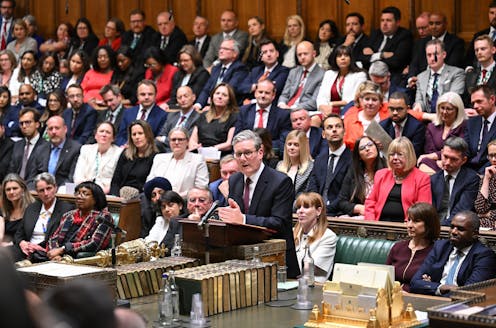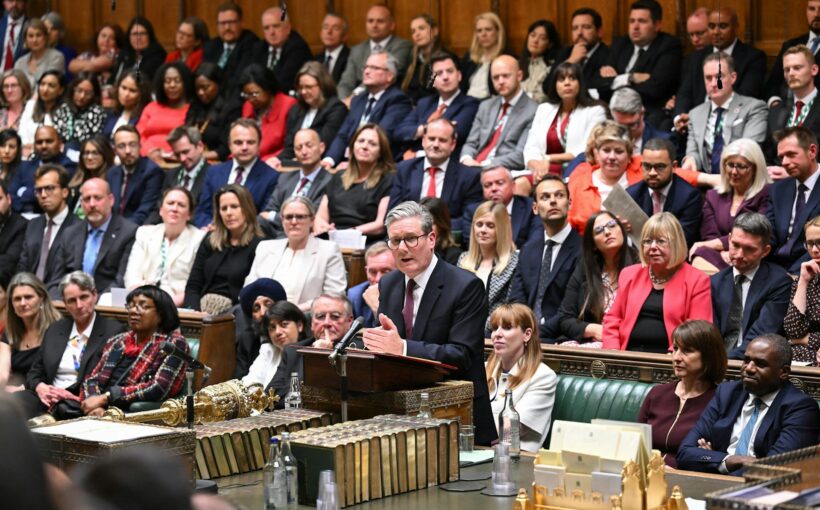
Following the state opening of parliament, the House of Commons has been debating the contents of the king’s speech (referred to as the debate on the address). This unfolds over the course of several days and is effectively a debate on the new Labour government’s legislative agenda for the next 12 months.
During the final votes in this debate, prime minister Keir Starmer suffered his first rebellion as several of his MPs voted against the government (and several more abstained) on a vote to lift the cap on child benefits that restricts support to a family’s first two children and no subsequent siblings. The vote was on an amendment put forward by the Scottish National Party, which has called for the cap to be removed.
Since before the election, Starmer and his chancellor Rachel Reeves have insisted that they would like to remove the cap but do not currently have the money to do so.
Want more politics coverage from academic experts? Every week, we bring you informed analysis of developments in government and fact check the claims being made.
Sign up for our weekly politics newsletter, delivered every Friday.
The rebellion was limited to seven Labour MPs and in truth there was very little chance of the amendment passing as the government had a working majority of 180 – and won the vote 363 votes to 103. Nor would the two-child limit have been immediately ended had the vote passed.
However, while small, this rebellion was symbolic. Votes on king’s speech debates are considered to be an issue of confidence because they drill into the heart of the government’s political agenda. The speech is not binding but it sets the tone for what the new government most wants to achieve.
Given the symbolic importance of the vote, Labour MPs were on a three-line whip, which is a strict instruction to attend and vote according to the government’s position. This may go some way to explaining why Starmer suspended the whip from those seven MPs who rebelled. This was a strong reaction to the rebellion, even if suspension is temporary and will be reviewed in six months by the government chief whip. The suspension means that the seven, who include former shadow chancellor John McDonnell and one-time Labour leadership hopeful Rebecca Long-Bailey, will now sit as independent MPs until the whip is restored.
The risks of this approach
There are risks to taking such a heavy-handed approach. The suspension or removal of the whip is considered to be a nuclear option when it comes to party discipline, mainly because the more you do it, the less effective it becomes. A precedent has been set in this case so when bigger rebellions come – and come they will – Starmer could run into problems. It would not be practical to suspend the whip from dozens of MPs.
That being said, there are those who will argue that the leadership wanted to send a message that dissent, particularly on important votes, will not be tolerated, even if Labour has a substantial governing majority.
The seven MPs who have been suspended are also from the left wing of the party and they already have an uneasy relationship with the prime minister. They are likely to be a rebellious bunch during the course of the parliament.
But the same rules apply in reverse, too. Rebelling against the whip is an action of diminishing returns as much as suspending people for rebelling. If you become a serial rebel, the government will just write you off as such and be less willing to pay attention to your concerns. Keeping rebellions to a minimum and only to the most important and consequential of issues is more likely to make the government sit up and listen to your concerns.
So there are multiple moving parts here in terms of how the rebels and whips continue to behave which will be interesting to watch over the course of this parliament.
What happens next?
In all likelihood, Labour will at some point remove the two-child benefit limit. A key part of its manifesto is to reduce child poverty and a large number of charities and thinktanks have highlighted the negative impacts of this policy in particular in that respect.
Read more: I research poverty in the UK – the two-child benefit limit is causing real and lasting harm
This of course raises the question of why, therefore, there was no pledge to end the cap in the king’s speech and why Starmer came down so hard on the rebels in this vote. The answer to this comes lies in the government’s iron-clad rules on spending commitments, which give it limited room to manoeuvre on tax and spending. The removal of the two-child limit will cost £3.4bn a year, according to the respected Institute for Fiscal Studies.
We might see some movement in the forthcoming budget (expected in the autumn), given the strength of feeling in the party on the issue. A lot of MPs feel strongly about this and have raised their concerns with the whips and cabinet, even if they didn’t rebel against the whip in this vote. That’s an alternative approach in trying to influence the government privately and may yet prove influential. Both in terms of the policy itself and the future of the seven suspended MPs, we should watch this space.
![]()
Thomas Caygill is currently in receipt of a British Academy/Leverhulme Small Research Grant for research on post-legislative scrutiny in the Scottish Parliament and has previously received funding from the Economic and Social Research Council.



